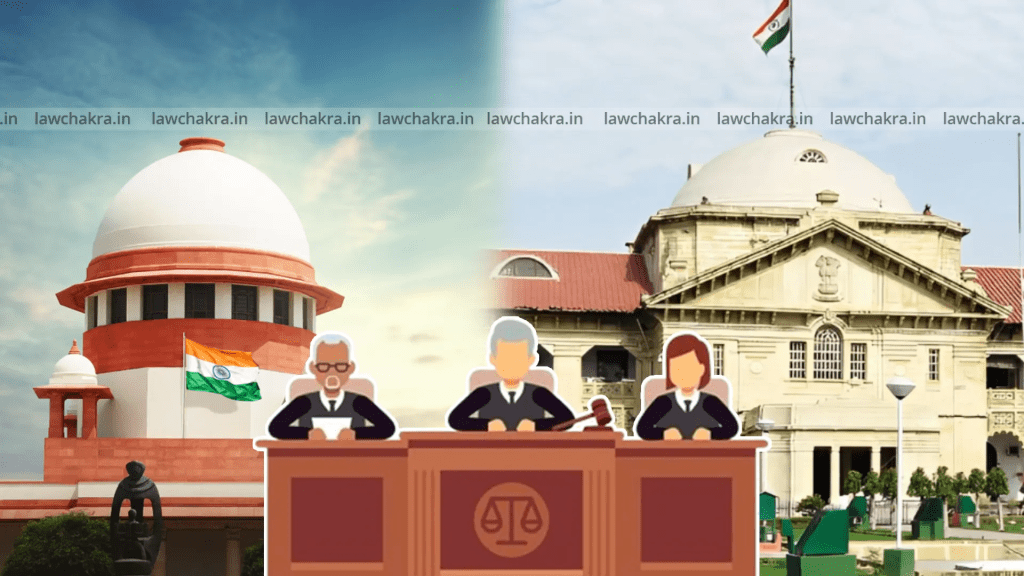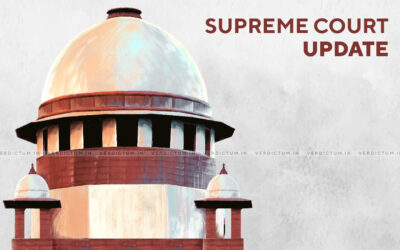“Such Errors Creep In At The High Court When Settled Law Is Not Applied Correctly”

Thank you for reading this post, don’t forget to subscribe!
The Supreme Court set aside an Allahabad High Court order refusing to suspend a convict’s sentence, stating, “Such errors arise in the High Court when settled law is not applied properly,” days after criticising another HC judge in a civil dispute case.
New Delhi: The Supreme Court set-aside an Allahabad High Court order that had declined to suspend the sentence of a man convicted under the POCSO Act, IPC, and SC/ST Act.
The Supreme Court once again expressed its dissatisfaction with an order from the Allahabad High Court for not adhering to established legal principles while denying a plea for the suspension of a sentence in a fixed-term conviction.
These remarks from the Supreme Court came shortly after it criticized an Allahabad High Court judge for permitting criminal proceedings in a civil dispute case.
In a rare decision, a bench comprising Justices J.B. Pardiwala and R. Mahadevan, on August 4, removed criminal matters from the roster of an Allahabad High Court judge “till he demits office” after the judge erroneously upheld summons of a criminal nature in a civil dispute.
The same bench criticized the high court’s decision in another case as well.
It stated,
“The impugned Order is one more from the High Court of Judicature at Allahabad with which we are disappointed,”
This plea originated from an order issued by the High Court on May 29, concerning a criminal appeal where the high court refused to suspend the substantive order of sentence imposed by the trial court.
Justice Pardiwala stated in an order on August 6,
“We are once again constrained to observe that such errors creep in at the level of the High Court and only because the well-settled principles of law on the subject are not applied correctly.”
He further added,
“It is very important to first look into the subject-matter. Thereafter the court should look into the issue involved. In the last the court should look into the plea of the litigant and then proceed to apply the correct principles of law,”
The Supreme Court pointed out that the High Court’s ruling was legally flawed and showed a disregard for established legal principles.
The case involved an appeal from a convict sentenced to four years of rigorous imprisonment under various provisions of the Protection of Children from Sexual Offences (POCSO) Actthe Indian Penal Code (IPC), and the Scheduled Castes and Scheduled Tribes (Prevention of Atrocities) Act, 1989, with the sentences ordered to run concurrently.
The convict had approached the high court with a request under Section 389 of the Criminal Procedure Codeseeking the suspension of his sentence.
However, the high court rejected this plea solely on the grounds of the offence being “heinous,” without appropriately considering the request in light of established legal norms.
In setting aside the high court’s decision, the bench referenced a landmark judgment mandating that appellate courts adopt a liberal stance in suspending fixed-term sentences unless exceptional circumstances justify otherwise.
Stressing the importance of judicial clarity, the bench remarked,
“It is very important to first look into the subject matter. Thereafter, the court should examine the issues involved, and only then consider the plea of the litigant before applying the correct principles of law.”
The Supreme Court specifically criticized the high court’s failure to analyze the application based on legal criteria.
The bench observed,
“What the high court did was to reiterate the prosecution’s case and the oral evidence, without engaging with the legal test for suspension of sentence in a fixed-term conviction,”
The order clarified,
“The High Court shall keep in mind that the sentence is for a fixed term, that is four years and it is only if there are compelling circumstances indicating that release would not be in public interest, that suspension may be denied,”
The bench thus cancelled the contested order and referred the case back to the High Court, instructing it to revaluate the suspension request in accordance with the applicable principles and to issue a decision within 15 days.
Case Title: aasif @ pasha v. State of up & ors.
Read Attachment

